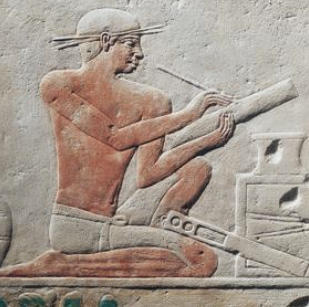Two scribes, relief from Mastaba of Akheteps at Saqqara
Bildquelle: Old Kingdom, 5. Dynasty, approx. 24000 B.C., Paris, Musée du Louvre
International workshop in collaboration with the Dahlem Humanities Center (DHC) at Freie Universität Berlin organized by Anne Eusterschulte (FU Berlin), Glenn W. Most (Pisa/Chicago) and Martin Kern (Princeton)
The transdisciplinary research project Philological Practices. A Comparative Historical Lexiconexamines philology as a praxis in a transcultural perspective. It is directed towards the preparation of a large one-volume lexicon presenting the most important terms that have been used by philologists to describe their activities in the history of scholarship in Classical traditions throughout the world. Such a lexicon, which recognizes not only the similarities in the terminologies of different traditions but also their differences and indeed the absence of certain terms from certain traditions, will make it possible to compare with one another the procedures involved. It will provide an enormously valuable basis for inter-disciplinary and inter-cultural communication, not only in the humanities, but from a transcultural, comparative point of view on a wide range of textual cultures and a plurality of classical traditions within intellectual history.
From a historical and systematical perspective, this lexicon project will inquire into philological practices in different textual cultures and the transcultural dynamics of knowledge transfer. It will illuminate dimensions of philology as a praxis in terms of scholarly, epistemological, educational or institutional practices. Against this background, the lexicon aims at providing a significant basis for both disciplinary and interdisciplinary work in a large number of fields of the humanities and social sciences as well as natural sciences and history of sciences.
The workshop will present expert talks on different classical cultures in view of the respective ways of understanding philological practices and their socio-cultural backgrounds in order to show the plurality of antiquities and classical cultures and open a transcultural dialogue. Each section of the workshop will illustrate text materials, techniques, epistemic conditions, scholarly networks and their development in meaningful materials.
Weitere Informationen
The conference is open to the public. We kindly ask to register via e-mail in advance. For registration and for more information please contact: Sara Ehrentraut, s.ehrentraut@fu-berlin.de
